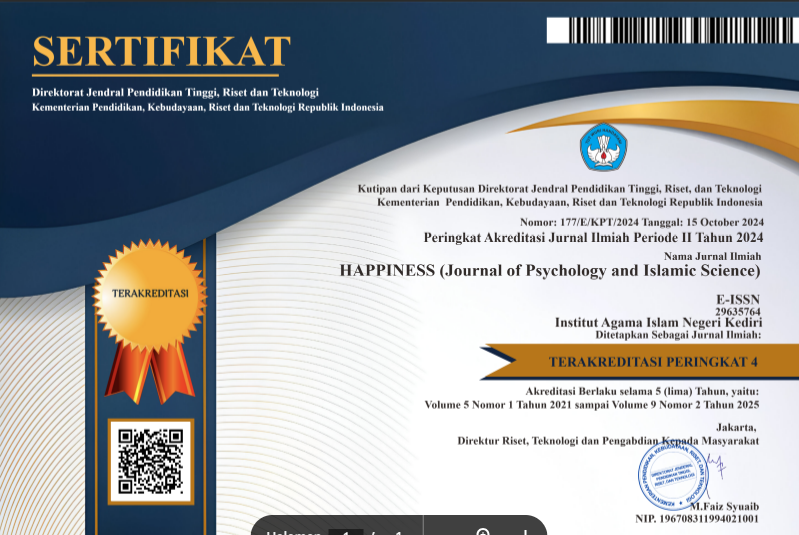Prososial Relawan Trauma Healing Korban Bencana Alam (Prosocial Trauma Volunteers Healing Natural Disaster Victims)
DOI:
https://doi.org/10.30762/happiness.v8i1.2213Keywords:
Prosocial, volunteers, trauma healing therapyAbstract
The geographical location of Indonesia's territory is traversed by the Pacific Circum which makes many active mountain ranges in Indonesia. Reporting from National Geographic, as many as 90 percent of earthquakes originate from the Pacific Circum which are caused by volcanic activity. The frequent occurrence of natural disasters causes many losses in addition to losses such as damage to buildings, deaths and victims who suffer minor to serious injuries are victims who experience emotional problems such as depression, anxiety, excessive fear and worry, even PTSD. The existence of trauma healing volunteers for victims of natural disasters as mentioned above is really needed to prevent the psychological problems experienced by victims of natural disasters from becoming worse. The volunteers needed by victims are volunteers who are not selfish or prioritize their own interests, volunteers who have an empathetic attitude towards victims and are aware of people who need help. Such volunteers by Santrock are volunteers who have a prosocial attitude. This research aims to look at the prosocial picture which includes: cooperation, sharing, helping, honesty and generosity of trauma healing volunteers. This research is a qualitative research type of phenomenological study. Online interview techniques by calling each informant were used to explore data for this research. The research informants were 3 active Indonesian volunteers to date who have been volunteers for at least 3 years. The results of the research describe the prosocial nature of natural disaster volunteers based on prosocial aspects, which include: 1) cooperation: the cooperation of volunteers is shown by the volunteers' willingness to balance personal interests with the interests of the volunteer organization and also that the informants can respect other people who have provided opinions. 2) Sharing: the form of sharing shown by volunteers is that volunteers like to share their joys and sorrows with other people. 3) Helping: the forms of helping behavior shown by volunteers are Informal Planned Helping and Emotional Helping. 4) Acting honestly: The form of honesty shown by volunteers is being honest in their words, namely saying what they are and not cheating. 5) Generous: the informant's form of generosity is that volunteers like to give charity by donating the proceeds from holding webinars and raising funds online via kitabisa.com for victims of natural disasters
Downloads
References
Amato. (1990). Personality and Social Network Involvement as Predictors of Helping Behavior in Everyday life Social Psychology Quarterly, 53.
Basrowi dan Suwandi. (2008). Memahami Penelitian Kualitatif. Jakarta: PT. Rineka Cipta.
BNBP, Data Informasi Bencana Indonesia (DIBI). https://dibi.bnpb.go.id/.
BNBP, Korban Meninggal Paska Erupsi Semeru Bertambah Menjadi 51 Jiwa. https://bnpb.go.id/berita/korban-meninggal-paska-erupsi-semeru-bertambah-menjadi-51-jiwa.
Fang, Yuan et al, (2019) Honesty-humality and prosocial behavior : The mediating roles of perspective taking and guilt-proneness. (Scandinavian Psychological Associations and John Willey & Sons Ltd.
Hamid, Muhammad. (2012). Dahsyatnya Menyantuni Anak Yatim dan Fakir Miskin, Yogyakarta : Tugu Publisher.
Muna’im, Mumuh. (2021). Relawan: Tak Terjadi Terlupakan, Terjadi Terbutuhkan. Bandung : Fokus Media.
McGuire, Anne (1994). Helping Behaviors in natural environment : Dimensions and correlates of helping. Personality and Social Psychology Bulletin, 20.
Muryadi dan Matulessy. (2012). Jurnal Psikologi Tabularasa / Vol. 7 No. 2. Religiusitas Kecerdasan Emosi dan Perilaku Prososial Guru.
Marjanovic, and friend, Who Helps natural-disaster victims ? Assesment of trait and situational predictors. Analyses of social Issues and Public Policy, 12 (1)
Nurul. Silmi. Apa Yang Menyebabkan Indonesia Rawan Terhadap Bencana Alam ?https://www.kompas.com/skola/read/2022/03/25/152045469/apa-yang-menyebabkan-indonesia-rawan-terhadap-bencana-alam.
Rofiq. M, Korban Erupsi Semeru Jengkel Daerahnya Jadi Ajang Selfie Tempat Wisata Dadakan, Detik News, https://news.detik.com/berita-jawa-timur/d-5850927/korban-erupsi-semeru-jengkel-daerahnya-jadi-ajang-selfie-tempat-wisata-dadakan
Salim dan Syahrum, Metodologi Penelitian Kualitatif, (Bandung: Citapustaka Media, 2012).
Samani, Muchlas dan Hariyanto. (2011). Pendidikan Karakter : Konsep dan Model. Bandung : PT. Remaja Rosda Karya.
Susanto, Ahmad. (2018). Bimbingan dan Konseling di Sekolah. Jakarta: Prenamedia.
Wiyani. Novan Ardy. (2014) Psikologi Perkembangan Anak Usia Dini, Yogyakarta : Gava Media.
Yudha, M dkk. Pembelajaran Kooperatif Untuk Meningkatkan Ketrampilan Anak TK. Jakarta : Departemen Pendidikan Nasional Direktorat Jenderal Manajemen Pendidikan Dasar dan Menengah Direktorat Pembinaan TK dan SD.
Downloads
Published
How to Cite
Issue
Section
License
Copyright (c) 2024 Mar'atus Sholikhah Pujianto, Nur Aziz Afandi, M. Syahrul Ulum

This work is licensed under a Creative Commons Attribution-ShareAlike 4.0 International License.





















